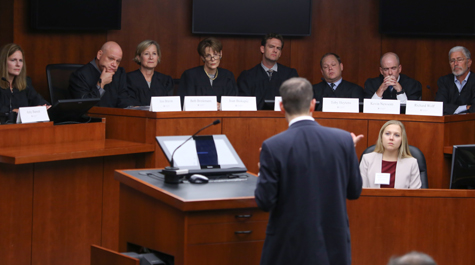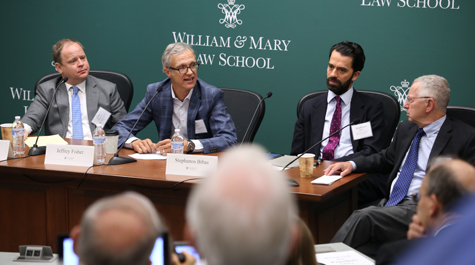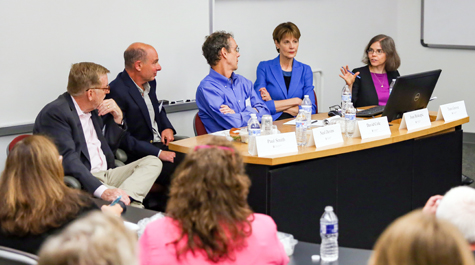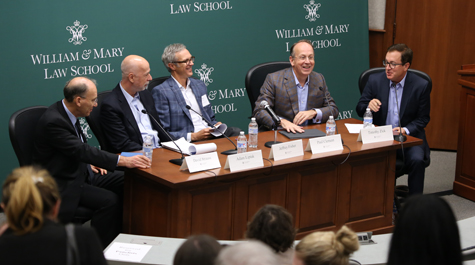William & Mary Law School Hosts 32nd Annual Supreme Court Preview
With the first Monday in October getting ever closer, interest in this year’s U.S. Supreme Court docket is intense. And once gain William & Mary Law School’s Annual Supreme Court Preview, sponsored by the Law School’s Institute of Bill of Rights Law (IBRL), brought in the experts to provide clarity and context.
The Preview, which began on Friday, September 13, featured five federal court of appeals judges, 17 Supreme Court advocates who have collectively argued more than 500 cases before the Supreme Court, and leading Supreme Court reporters and columnists from the nation’s top newspapers, including the New York Times, Washington Post, USA Today, CNN and the Wall Street Journal.
“I think those of us who have covered the Supreme Court for many years see the annual conference at the William & Mary Law School as the best event of its kind,” said David Savage of the Los Angeles Times. Savage, who has been attending the annual event since its inception, praised the IBRL and its director, Professor Neal Devins, for doing a “great job of bringing together a dozen of the best and most successful lawyers who argue regularly before the Court.”
As is customary, the Preview opened with a moot court, this one focusing on Bostock v Clayton County, Georgia. The issue in the case concerns whether federal employment discrimination laws cover sexual orientation. Gerald Bostock worked as a child welfare services coordinator and claimed that he was fired for being gay. According to Bostock, Clayton County of Georgia falsely accused him of mismanaging public funds as a pretext for dismissing him.
In the moot court session, Adam Unikowsky, partner at Jenner & Block, represented the petitioner, Bostock, and Irv Gornstein, executive director of the Supreme Court Institute at Georgetown University Law Center, represented the respondent, Clayton County.
The mock Supreme Court judges consisted of: Joan Biskupic (CNN) as Chief Justice, Bob Barnes (Washington Post), Amy Barrett (U.S. Court of Appeals, Seventh Circuit), Jess Bravin (Wall Street Journal), Beth Brinkmann (Covington & Burling), Aaron-Andrew Bruhl (William & Mary Law School), Toby Heytens (Solicitor General, Commonwealth of Virginia), Kevin Newsom (U.S. Court of Appeals, Eleventh Circuit), and Richard Wolf (USA Today). Their final decision was 5-4 in favor of the respondent.
“We have to think about the backdrop of the Civil Rights Act and the restraints that it places on employers,” Bravin said in the majority opinion. “The baseline in our free enterprise system is the freedom of the economic actor to do as he or she sees fit. There are times when that should be restricted or regulated for the public good, but we believe that the default is for the freedom of the individual actor rather than the restriction no matter how benign or how beneficial we individually think that the restraint may be.”
To view the moot court session, please visit our You Tube page.
The Friday night programming also featured a panel on what to expect from the Roberts Court. Panelists included Kannon Shanmugam (Paul | Weiss), Carter Phillips (Sidley Austin), Adam Liptak (New York Times), Pamela Karlan (Stanford University Law School), and David Strauss (University of Chicago Law School).
To view the panel session, please visit our You Tube page.
The Preview continued on Saturday, with panels and breakout sessions throughout the day. Experts considered the most interesting and important cases on the Court’s docket, including race discrimination, age discrimination, state aid to religious schools, the Trump administration’s repeal of Obama immigration policies, gun rights, and the Affordable Care Act. Panels also considered legal issues that seem to be heading to the Court, including abortion, the First Amendment, and deference to federal agency statutory interpretation.
Lunchtime breakout sessions included a panel on “Advocacy” moderated by Beth Brinkmann; one on “Judges” moderated by Allison Orr Larsen of William & Mary Law School; and one on “Chief Justice Roberts and Challenges to the Supreme Court’s Legitimacy,” moderated by Tara Grove of William & Mary Law School.
The Preview is designed so that a general audience may learn more about the workings of the Supreme Court, but law students especially benefit. At one point Stephen Marlowe J.D. ’20 found himself sitting next to, and briefly chatting with, David Cole, national legal director at the ACLU.
“Looking around the room Saturday morning, I was star-stuck with the legal talent there,” Marlowe said. “Thanks in part to excellent training in Fed Courts with Professor [Tara] Grove last year, I was able to follow sophisticated panel discussions with relative ease. What an awesome Saturday.”
Mechelle King J.D. ’21 was equally impressed. “The Preview is such a valuable opportunity for students like me to be exposed to an incredible bench of experts—constitutional scholars, judges, career litigators--each sharing their thinking on the pressing legal questions of our time, and all in the same room where I took contracts and torts,” King said.
Read more responses from William & Mary Law students.
The Preview was streamed live and can be viewed on William & Mary Law School’s You Tube channel. Panels include:
- Criminal Law - Toby Heytens, Jeffrey Fisher, Stephanos Bibas, David Savage (moderator)
- Immigration Law - David Strauss, David Savage, David Cole, Erwin Chemerinsky, Richard Wolf (moderator)
- Business Law - Kannon Shanmugam, Andrew Pincus, Carter Phillips, Paul Clement, Jess Bravin (moderator)
- Civil Rights - David Cole, Pamela Karlan, Paul Smith, Erwin Chemerinsky, Bob Barnes (moderator)
- Constitutional Law - David Strauss, Adam Liptak, Jeffrey Fisher, Paul Clement, Timothy Zick (moderator)
For podcasts of the above panels, please visit our SoundCloud page.
Professor Katherine Mims Crocker, who joined the William & Mary Law faculty this past summer, considers the Preview “an amazing event.”
“It provides an opportunity to get a practical peek at upcoming cases while also learning from the thoughtful perspectives of some of the most well-respected practitioners, journalists and professors in the nation,” Crocker said. “The success of the Preview year after year speaks volumes of William & Mary Law School and the people here who dedicate so much time and energy to planning and hosting it.”
Visit our Gallery page for more about the 2019 Supreme Court Preview.
About William & Mary Law School
Thomas Jefferson founded William & Mary Law School in 1779 to train leaders for the new nation. Now in its third century, America's oldest law school continues its historic mission of educating citizen lawyers who are prepared both to lead and to serve. citizen lawyers who are prepared both to lead and to serve.



